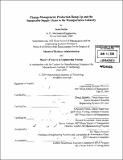Change management, production ramp up and the sustainable supply chain in the transportation industry
Author(s)
Fortin, Sean (Sean Dubé)
DownloadFull printable version (43.85Mb)
Other Contributors
Leaders for Manufacturing Program.
Advisor
Daniel Whitney and Sebastian Fixson.
Terms of use
Metadata
Show full item recordAbstract
The ramp up phase is always the most risky part of any project, especially with a product material the company and its partners have very little experience with. One result of this lack of experience is frequent engineering changes to address design corrections and improvements. High levels of change create uncertainty within both the supply chain and the engineering change management systems. Just as a supplier may not be able to meet production requirements, elements of the change process may not be sufficiently flexible to account for the level of change the project experiences during production ramp up. A study of Bus Solution Systems' (BSS) Super Hotel Coach (SHC) program change management system will show that unsuitable change management system processes can cause downstream delays just as unsuitable supply chain strategy can cause the same. This thesis details a situation where the SHC program's Materials Management Department (MMD) was having difficulty with visibility into the change management system. As a result of the situation, SHC MMD did not have the ability to order parts on time. The effect was that there were an increased number of parts needed for manufacturing jobs but were not in stock, and sometimes yet to be ordered. The ultimate result of this problem, and the multitude of other problems impacting the SHC not investigated in this thesis, was a bus program that was 2 years behind schedule in early 2009. (cont.) This thesis aims to correct the SHC MMD engineering change visibility issue by examining the current state of the engineering change process through a shortage part case study and by applying supply chain management strategy principles to extract part ordering information from the SHC General Engineering Change Process earlier. This thesis also proposes a long term systematic solution that would help prevent shortages from occurring in the future. The intent of the recommendation is to reduce the chance of shortage occurrences so as to prevent further delay of the SHC program.
Description
Thesis (M.B.A.)--Massachusetts Institute of Technology, Sloan School of Management; and, (S.M.)--Massachusetts Institute of Technology, Engineering Systems Division; in conjunction with the Leaders for Manufacturing Program at MIT, 2009. Includes bibliographical references.
Date issued
2009Department
Leaders for Manufacturing Program at MIT; Massachusetts Institute of Technology. Engineering Systems Division; Sloan School of ManagementPublisher
Massachusetts Institute of Technology
Keywords
Sloan School of Management., Engineering Systems Division., Leaders for Manufacturing Program.